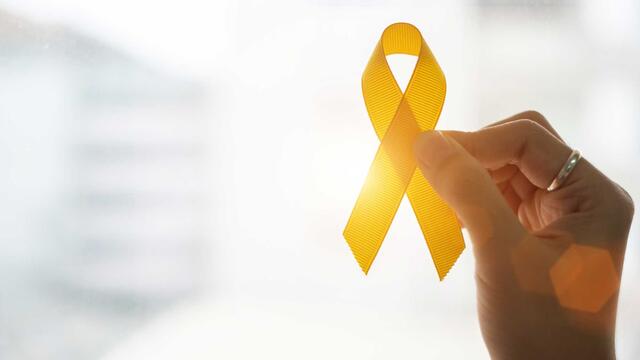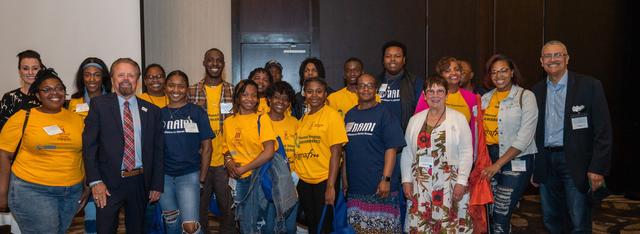
Counseling Services
On-campus mental health support

To our Central State students: We are here to serve you.
Central State University Counseling Services has your back, offering extraordinary mental health services, including culturally responsive one-on-one counseling, stress management workshops, suicide prevention training, a relaxation room with massage chairs, a study resource room, a music room complete with a guitar and drumset, and more.
Counseling Services is open for in-person appointments from 9 a.m. to 5 p.m. Monday through Friday. Please call 937-376-6338 to make an appointment, leaving a detailed, confidential message with your name, contact phone number, email, days and times you are available, and the date you called.
For on-campus support, please email us using the contact details below.
Referral form
If you or someone you know is struggling, please use the Central State University Counseling Services Online Referral Feedback Form. All referrals are confidential. You can also call or text 988 or chat at 988lifeline.org.
Get help now
The United States experienced one death by suicide every 11 minutes in 2020, according to the Substance Abuse and Mental Health Services Administration (SAMHSA), part of the U.S. Department of Health & Human Services. Mental health conditions do not discriminate, and everyone needs support at times.
Suicide is a leading cause of death for people aged 10-34 years, and we can all work to increase suicide prevention awareness and spot the signs of depression and other mental health conditions.
Below you will find local, state, and national resources available to anyone who is struggling.
You are not alone
Seventy-five percent of all mental health conditions begin by age 24, according to the National Alliance on Mental Illness (NAMI). That's why it is vital to practice self-care, seek mental health support when you need it, and lend a compassionate ear to those who you know are struggling.
Mental health encompasses emotional, psychological, and social well-being. While common — with an estimated 1 in 5 Americans experiencing a mental health condition in a given year — we still have a long way to go to end stigma and ensure everyone has access to quality, affordable mental health services.
Obstacles to mental health treatment among racial and ethnic minorities include lack of or insufficient health insurance, lack of racial and ethnic diversity among mental health care providers, lack of culturally competent providers, financial strain, and stigma, according to the U.S. Centers for Disease Control and Prevention.
If you are struggling, know that you are not alone.
PSA: How to use NARCAN in the case of a drug overdose
-
The 988 Suicide & Crisis Lifeline offers free, confidential support 24 hours per day, seven days per week, 365 days per year. If you or someone you know is struggling or in a crisis, text or call 988 or chat at 988lifeline.org. Click here for more information about SAMHSA.
-
The National Alliance on Mental Illness (NAMI) is a leading support organization serving people with mental health conditions and their loved ones. The student-led Central State University NAMI chapter is active on campus, offering special events such as art therapy sessions. Access NAMI's Mental Health Guide for more information about student mental health.
-
Health disparities have contributed to an epidemic of mental health among racial and ethnic minorities, partially due to stigma, a lack of access to mental health services, and social determinants of health. Each July, the nation observes National Minority Mental Health Awareness Month to address the unique challenges of those from Black, Indigenous, and people of color (BIPOC) communities. Learn more about Minority Mental Health. Additional information about mental health from the U.S. Centers for Disease Control and Prevention can be found at https://www.cdc.gov/mental-health/.
HelpLine.org, an independent nonprofit organization, offers an informative article on what to expect when calling a helpline.
Your mental health is our priority
If you are experiencing a mental health issue, we strongly encourage you to visit the Central State University Counseling Center. We accept walk-ins, but appointments are encouraged to permit adequate time to assess your specific needs. Our counselors are compassionate and non-judgmental, and all services are confidential.
The Counseling Center offers a referral form that you may complete for yourself or to refer another student. This form goes directly to Counseling Services. Click here to complete a referral for yourself or another student.
We also asked that faculty, staff, and the Central State campus community continue to complete the above referral form if you know of a Marauder who needs support from Central State Counseling Services.
Thank you for entrusting us to serve you as you power through life's challenges to blaze a trail for future Marauders. Remember, we are here for you.
Refer a friend
The Central State University Counseling Services Online Referral Feedback Form is available for faculty, staff, students, and the campus community. All referrals are confidential. Thank you for supporting students at Central State University.
Campus Violence Prevention Program
The Campus Violence Prevention Program raises awareness and promotes the prevention of interpersonal and sexual violence to create a safe campus environment.
We care about your safety. Learn more about how we can all unite to prevent violence in our campus community through education and awareness.
NAMI on Campus

The mission of the student-led NAMI on Campus chapter is to promote awareness and reduce stigma of mental health illness on Central State campus.
History
NAMI on Campus is a peer-led mental health awareness organization on college campuses. Student members raise awareness on their campuses about mental health, reduce stigma, and become advocates. Clubs are open to all students, faculty, and staff, regardless of their own experiences with mental health. The Central State University NAMI on Campus organization was founded in 2016.
Current initiatives
Central State Counseling Services collaborated with NAMI to develop the Central State NAMI on Campus chapter. Marauders are recruited to provide peer advocacy in promoting mental health awareness and reducing stigma on campus. The chapter's student leaders and members provided educational materials, resources, support, and activities related to mental health concerns. They also collaborate with other student organizations and University departments to host events.
All services and support give hope to Marauders and the campus community who may be experiencing a mental health-related issue or crisis. Click the headers below to learn more about on-campus initiatives.
Special thanks to Mental Health First Aid, the ADAMHS board, and NAMI, the latter of which has been one of Counseling Services' biggest supporters by donating materials and monetary resources to fund these and other educational events and activities.
-
The Resilience Program is hosted by a CSU NAMI on Campus member in collaboration with the Counseling Services office. Students discuss different topics, such as difficult experiences, and learn skills to overcome obstacles and move forward toward a bright future.
-
Central State Virtual Walk, Run, and Ride and National Mental Health Awareness Walk is a campus community event in which participants walk alone or in a group while social distancing.
-
Peer-to-peer group sessions (Let’s Taco 'Bout It Taco Tuesday) is open to all students, although is primarily geared toward freshmen. The sessions are one wway to check on peers to see how the semester. Students check in to find out how their peers feel about being away from home, talk about ways to manage stress, and inform them of counseling services on campus. It is an excellent way for students to relate to one another and identify similar experiences.
-
Mental Health First Aid (MHFA) training is available to all students. Many include resident advisors and student leaders. The training is facilitated by Montgomery County Alcohol, Drug Addiction and Mental Health Services.
-
A student theater production of the plays “Yes I Can” and “Healing Through Expressions” was a partnership between Counseling Services, the Theater Arts program, and NAMI on Campus. It involved the creation and presentation of an original docudrama that explored individual challenges, surprises, and successes of collective experiences during the COVID-19 pandemic as well as racial suppression and police brutality. Students worked with writers to process stories of lived experiences that examine issues of culture, safety, and identity during the present day.
-
Art therapy helps students relieve stress in a soothing and creative way. Relaxation activities provide a form of self-care to reduce stress during finals week. In arts and crafts, students can create mason jars to store positive and uplifting messages. They can also be created as makeup brush or pencil holders or other uses. Your jar is a personal gift from yourself to yourself.
Movie Night offers a movie with a person who may be dealing with a mental health condition who learns to manage throughout their daily life.
Game Night provides a fun activity to reduce stress.
A campus scavenger hunt can stimulate the mind in a fun way to reduce stress.
-
Weekly outreach tables inform students about Counseling Services and NAMI, sharing a variety of information to promote mental health awareness, identify types of mental health conditions, and reduce stigma. These tables, located in the cafeteria, are a collaboration between NAMI on Campus and University Counseling Services and Student Affairs.
-
NAMI on Campus members have the opportunity to attend state and national leadership conferences, including NAMI conventions.